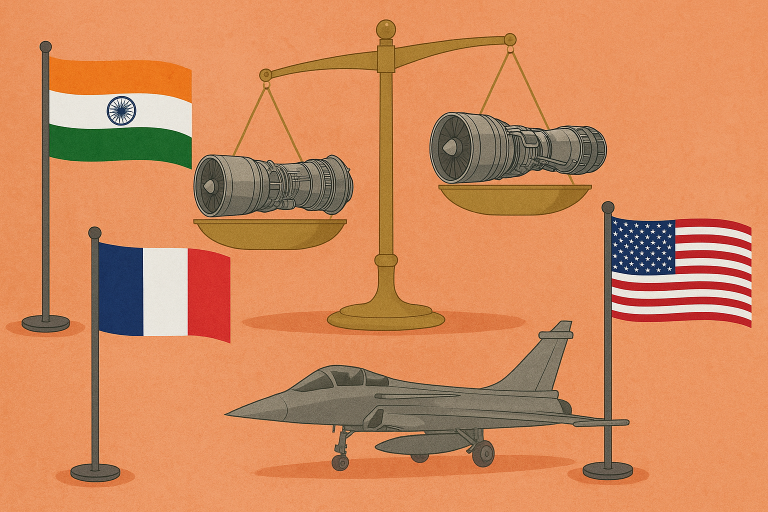India is assessing the option of French-made fighter jet engines as its negotiations with the US over a joint manufacturing project encounter delays, according to senior officials in New Delhi.
Discussions are underway with Paris-based Safran SA over supplying or co-producing engines for India’s next-generation Tejas Mark-2 aircraft.
According to a Bloomberg exclusive, the project is critical to replacing ageing fleets of Jaguars and Mirage-2000s while building domestic capability.
Talks with Washington on co-producing GE F-414 engines, once seen as a major step in deepening defence ties, have slowed despite being a key component of agreements between Prime Minister Narendra Modi and former US President Joe Biden.
India explores alternative to US engine deal
The Tejas Mark-2 was originally set to be powered by the US-made GE F-414 engine, with plans for joint manufacturing in India. However, while negotiations with the US are still ongoing, officials noted that progress has been sluggish.
This has pushed New Delhi to explore alternatives, with Safran emerging as a leading candidate. Officials did not specify whether India plans to purchase French engines outright or pursue a co-production arrangement with Paris.
The delays come as India looks to accelerate the development of around 200 advanced jets to boost its air force capacity.
The urgency stems from the need to phase out older jets, including British-made Jaguars and French Mirage-2000s, which are still operational but due for retirement.
Strategic push for defence self-reliance
India’s interest in diversifying suppliers is driven by a broader strategy to reduce dependence on any single partner, particularly Russia, which has historically been its largest defence provider.
Under Modi’s leadership, the government has sought to localise defence manufacturing, making joint ventures with global arms makers a priority.
The Ministry of Defence has been steering policy towards private-sector involvement, recently allowing Indian companies for the first time to design and develop advanced warplanes.
This policy shift aligns with India’s position as the world’s second-largest arms importer, as documented by the Stockholm International Peace Research Institute, and its ambition to transform into a hub for military hardware production.
Urgency following border conflict
The push for new jets comes after a near full-scale conflict with Pakistan earlier this year that involved air strikes, drones, missile exchanges, artillery, and small arms fire along their border.
The confrontation underscored the urgent requirement for modern and domestically produced combat aircraft to strengthen India’s defences.
While relations with the US remain strained following President Donald Trump’s imposition of 50% tariffs on Indian goods, defence engagements continue.
Last week, a team from the US Defense Department and Boeing executives visited India to negotiate the potential sale of $4 billion worth of surveillance aircraft, according to Bloomberg reports.
Defence partnerships in transition
Safran, which has long supplied engines for India’s existing Mirage fleet, is seen as a trusted partner for technology transfer, though no official details have been disclosed.
Meanwhile, US talks on co-manufacturing the GE F-414 remain active but slower than initially expected.
India’s Ministry of Defence did not respond to requests for comment, and Safran representatives declined to provide details.
Still, the dual-track approach highlights India’s intent to balance ties with both the US and France while pressing ahead with its broader defence modernisation drive.
The post India weighs French jet engines as US deal for Tejas Mk-2 faces delays appeared first on Invezz

